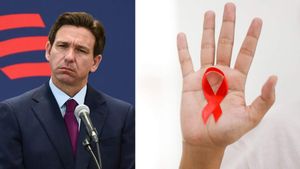Only hours before Donald Trump left the White House, the outgoing administration proposed a sweeping change to Medicare that could limit millions of Americans' access to lifesaving treatments, especially antiretroviral medications used to treat persons living with HIV.
This change would create a public health challenge to the care continuum by taking direct aim at Medicare's "Part D" prescription drug benefit.
For most types of drugs — like statins, which are used to prevent heart attacks and stroke — Part D plans are only required to cover two per therapeutic class. But for medications across the six protected classes — critical medicines like anticonvulsants, antipsychotics, immunosuppressants, and the like — plans are required to cover "all or substantially all" of the drugs.
Those medications are protected for good cause. About 25 percent of people living with HIV in the United States depend on Medicare for their antiretrovirals, care, and preventative services. These patients often require very tailored treatment regimens.
The Trump administration's proposal would do away with those critical protections. It'd abolish the six protected classes beginning in 2022, with a one-year delay for HIV medications. This change allows Part D plans to cover only one drug in each protected class, rather than "all or substantially all." The proposal would also allow insurers to require prior authorization for those just starting therapy — and "step therapy" protocols, which require patients to "fail" on older, less expensive medicines before accessing newer, more tailored ones.
As a result, beneficiaries living with HIV and other chronic diseases could lose access to the preferred medication regimens that they and their doctors have decided on.
Right now, most employer-sponsored plans have an upper limit on expenses in any given year. Once patients reach that limit — known as an "out-of-pocket maximum" — their insurance plans cover 100 percent of all remaining medical expenses. But Part D plans don't have those types of out-of-pocket considerations. As a result, people prescribed medications across the six protected classes often face hundreds — even thousands — of dollars in pharmacy bills before they reach their deductible. As recently as 2017, about 1 million Part D enrollees faced over $3,200 in annual out-of-pocket costs.
Many can't afford those costs and some, consequentially, stop taking their medications as a result. In fact, prescription non-adherence alone accounts for about one in 10 hospitalizations, and about 125,000 deaths each year.
Considering that one in five new HIV transmissions comes from patients currently in care but haven't yet reached viral suppression is reason enough to give the Biden administration pause on this new rule.
For individuals living with HIV, that often results in viral suppression issues. HIV medications only work when they stop the virus from replicating or making copies of itself. If a person's viral load is undetectable, it's non-transmissible. But, when a particular strain of HIV starts making copies of itself there's potential for onward transmission.
Some states are also already flexing their own protected class muscles — even though this rule doesn't apply to Medicaid programs — by limiting access to "non-preferred" medications for people living with HIV.
To protect people living with HIV, the Biden administration must reverse the Trump-era attack on Medicare's six protected classes. That's the only way to ensure that those living with HIV have access — without restrictions — to the therapies they need.
Brian Hujdich is the executive director of HealthHIV, a national HIV non-profit organization.







































































